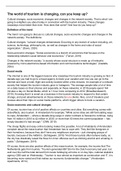The world of tourism is changing, can you keep up?
Cultural changes, socio-economic changes and changes in the network-society. That is what I am
going to enlighten you about today in connection with the tourism industry. These changes
nowadays move faster than ever. How does that come? And how do you keep up?
Definition of the trend
The trend I am going to discuss is; cultural changes, socio-economic changes and changes in the
network-society. The definitions:
Cultural changes: “cultural changes embarrasses Occurring in any branch of culture including, art,
science, technology, philosophy etc. as well as changes in the forms and rules of social
organization.” (Davis, 2020)
Socio-economic changes: “Social economics is a branch of economics that focuses on the
relationship between social behavior and economics.” (Tarver, 2019)
Changes in the network-society: “a society whose social structure is made up of networks
powered by micro-electronics-based information and communications technologies” (Castells,
2004)
Social media
The internet is one of the biggest reasons why nowadays the tourism industry is growing so fast. A
decade ago you had to go to a travel agency to book your vacation and now you can go to the
internet and have a hotel, flight and activity booked within a few minutes. An example of a network
society that helped the tourism industry grow is Instagram. The average people take a lot of time
on a daily bases on their phones and especially on these networks; in 2018 people spend 144
minutes a day on Social Media, which is 1 hour more comparing to 2012 (Broadbandsearch,
2019). Knowing that it is smart as a business in the tourism industry to respond to that certain
change, and post advertisements on those networks to lure clients. Also, a lot of travelers post
reviews about their trips on social media platforms, which trigger others to book a vacation.
Socio-economic and cultural changes
Of course, tourism has a lot of positive effects on countries and cities. But everything comes with
side-effects, also tourism. In Amsterdam for example; "While some cities are still formulating ways
to cope, Amsterdam -- where a decade-long surge in visitor numbers is forecast to continue, rising
from 18 million in 2018 to 42 million in 2030, or more than 50 times the current population -- has
simply decided it's had enough." (CNN, 2019)
The cheap flights and easy online booking makes this possible. A lot of inhabitants of Amsterdam
complain about the mass-tourism that Amsterdam has to cope with. They feel like foreigners in
their hometown, because they don't have any neighbours anymore – just changing groups of
tourists, because of the AirBnb's. (Schlagwein, 2019) "And those tourists often behave badly, so
the city has drastically raised the fines for minor offences such as drinking alcohol and urinating in
public." (Schlagwein, 2019)
Of course, there are also positive effects of this mass-tourism, for example, the income that The
Netherlands gets from tourists. "Tourism generated €87.5bn for the Dutch economy last year, but
well over the half the total derived from locals holidaying at home or on day trips, national statistics
agency CBS said on Wednesday. ‘Tourism is now almost as important as construction and IT, it is
becoming more varied and that makes our economic fundamentals stronger." (Amsterdam
Apartments, 2014)





